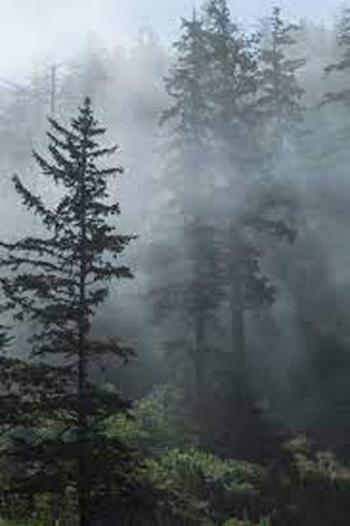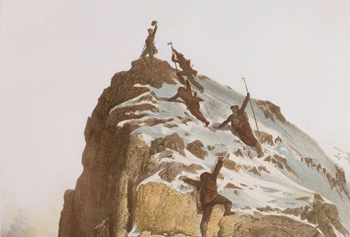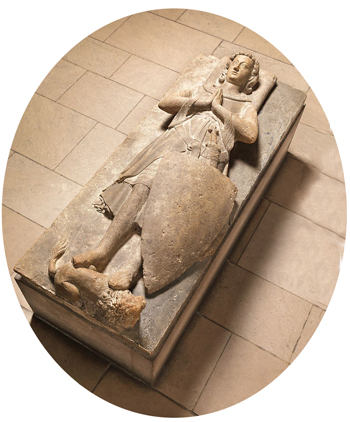Catholic Virtues
 |
 |
 |
 |
 |
 |
 |
True & False Paths to Happiness - XXXI
The Splendors of Mystery
All the ways of sacral contemplation we have seen hitherto lead to the splendors of light; today's road, paradoxical as it may be, leads to the splendors of obscurity, for its theme is the unknown. And the unknown also has its splendors.
 In sacral contemplation, almost everything is light and color, refulgence and splendor, but there is also a place for mystery with its own special beauty and appealing superiority.
Why appealing and why superior? Would it not be exactly the opposite? Would not this mystery be like a wall stranding before us that prevents us from seeing and moving forward, and thus hinders us? What is attractive about this obstacle?
In sacral contemplation, almost everything is light and color, refulgence and splendor, but there is also a place for mystery with its own special beauty and appealing superiority.
Why appealing and why superior? Would it not be exactly the opposite? Would not this mystery be like a wall stranding before us that prevents us from seeing and moving forward, and thus hinders us? What is attractive about this obstacle?
One could object that mystery is the opposite of contemplation; that mystery is a mist, darkness. The reasonable thing is to turn your back on it and observe only verifiable phenomena, and then determine the laws that govern them using an absolutely scientific criterion.
In fact, the objection continues, science will eventually dissipate all enigmas. One must flee from the vain speculations they nourish.
Positivist minds – theoretical or practical – despise mysteries because they think they are the opposite of reality. However, it is precisely for the sake of reality that one should love them. One of the aspects most characteristic of innocence is a facility to admit the mystery, to not be insulted by it, but, to the contrary, to coexist with it and to understand that the mystery is not a hostile blackness, but a forest whose mere existence is suggestive to the human mind.
For the innocent soul, the beauty of mystery is the summit of truth. To the contrary, the soul that has become rigid and unresponsive through the Enlightenment Philosophy, Positivism and similar doctrines, feels something tormenting in the mystery.
The hierarchical spirit loves mystery
A man loves mystery when he has a profoundly hierarchical spirit.

 When someone says a person has a hierarchical spirit, the first thing one things is that he is intransigent in maintaining hierarchy in everything below him and tends to disregard what is above him. From this view, the hierarchical spirit would be dictated by pride; it would desire the subjection of what is inferior to it, but it would be egalitarian in relation to what is higher that it.
When someone says a person has a hierarchical spirit, the first thing one things is that he is intransigent in maintaining hierarchy in everything below him and tends to disregard what is above him. From this view, the hierarchical spirit would be dictated by pride; it would desire the subjection of what is inferior to it, but it would be egalitarian in relation to what is higher that it.
There are, indeed, people like that. For them, hierarchy has, so to speak, the right hand without the left, or vice-versa. This is not, however, the true anti-egalitarian spirit.
The true hierarchical spirit loves what is below it and principally, it loves what is above it. This position is not easy for human nature corrupted by original sin, but this is the fullness of the anti-egalitarian mindset.
Now then – and here we touch the crux of the matter – the search for truth is an ascent. And, like in many ascents, the peak of the mountain is snowy, covered in mist and lost in the heights. Without entering this fog one cannot reach the peak. To understand and love this fog is to understand and love the ascent. You have to love the mist to truly appreciate the heights.
This is why one can speak of the “appealing superiority of mystery.” We must love all superiorities. Superiority must be appealing to us. And thus we will love mystery. We will love God, who is the Superior par excellence and is Mystery par excellence.
God is above all creatures. He is the Unfathomable, the Mysterious, the Unattainable, the Unimaginable. A person looks at himself and exclaims: “I cannot conceive what God is like, but this mystery, which hovers over everything, enchants me.”
I really believe that one of the charms of the medieval Gothic churches is that they indicate what God is like and, at the same time, they possess a mystery whereby one can see that there is some shadow in them that is brighter than light – and that is the mystery.
Mystery is at the top of every hierarchy. It is necessary to understand and love the mystery, as all the Saints did, especially the greatest mystics such as St. John of the Cross, a Doctor of the Church whose writings were filled with mystery.
Wrong attitudes toward mystery
It hardly needs mention – for we all know of such cases – that the attraction to mystery can lead to dangerous deviations, such as the occult, superstition and self-idolatry. Because mystery is nebulous, it can be a continuous temptation for those who wish, so to speak, to fish in murky waters.
 Taking a viscerally hostile position against any form of esotericism, we should known how to wade into the unknown in a Catholic, disinterested and detached way – without ulterior motives.
But, in addition to the occult, there are two other wrong attitudes towards the superiorities of the mystery:
Taking a viscerally hostile position against any form of esotericism, we should known how to wade into the unknown in a Catholic, disinterested and detached way – without ulterior motives.
But, in addition to the occult, there are two other wrong attitudes towards the superiorities of the mystery:
1. Indifference: Those who are indifferent to mystery are those avid for concrete things – money, technology, a worldly life – and they turn their backs on everything else.
2. Egocentrism: An insane egocentric appetite gives vent to the person's evil tendencies. The egocentric, by definition, only thinks of himself and only appreciates what is at his level.
The soul that has innocence, however, loves mystery, for it recognizes its own limitations and loves what is above it.
The gradations of mystery
There are a thousand ways the mystery can present itself. There is the mystery of total darkness, which has its beauty. There is the mystery of darkness with glimpses of light, and there is the mystery of clear things that have some obscurities.
Furthermore, there is a darkness that is not exactly pitch black, but what the French call foncé (dusky). A whole study on the phantasmagoria of mysteries could be made.
 And then there is the mystery of death. The person, when dying, can say the following: “I am going to immerse myself in the full mystery, which will be my immersion into the infinite and benevolent mystery that now receives me.” To die understanding this is more than to live.
And then there is the mystery of death. The person, when dying, can say the following: “I am going to immerse myself in the full mystery, which will be my immersion into the infinite and benevolent mystery that now receives me.” To die understanding this is more than to live.
It does not seem to me that a soul is truly ready to be called by God without having this well-formed sense of mystery.
If one knew how to present religion to hippies precisely from this angle of the mystery, many of them would lose their depredatory spirit, which is a desire to lash out at everything because modern bourgeois existence is presented to them as the final end, the ultimate reason for living.
The search for truth, however, is not intended to end in an apotheosis with all the lights on, because that would be a frustration. It is preferable that it end in twilight. Hippies should be told: “Yes, there is darkness and, beyond the shadows, there is mystery. And since mystery exists, you must transcend."
Man today easily loses the sense of mystery because he forgets to transcend.
Sacral contemplation leads to mystery
The various roads that lead to the sacral contemplation we have discussed so far are applications of the principle of analogy, that is, of the similarities existing between the Creator and the created. These paths help us a great deal because they can help us to transcend very high. They are not centered on the idea of mystery, but of beauty.
However, these paths, so excellent, cannot lead us to a full knowledge of God, who is infinite. What is the beauty of a castle or a Gothic cathedral compared to the supreme beauty of God? God is beyond all we can conceive; He is unknowable. Therefore, the final end of sacral contemplation is the sense of mystery.
Between God and us there is a separation, a separatio in Thomistic language, that is a total, absolute, infinite separation. There is a realm of mysteries there that our limited mind can never cross.

Continued


The morning mist creates
an ambience of mystery in the forest
One could object that mystery is the opposite of contemplation; that mystery is a mist, darkness. The reasonable thing is to turn your back on it and observe only verifiable phenomena, and then determine the laws that govern them using an absolutely scientific criterion.
In fact, the objection continues, science will eventually dissipate all enigmas. One must flee from the vain speculations they nourish.
Positivist minds – theoretical or practical – despise mysteries because they think they are the opposite of reality. However, it is precisely for the sake of reality that one should love them. One of the aspects most characteristic of innocence is a facility to admit the mystery, to not be insulted by it, but, to the contrary, to coexist with it and to understand that the mystery is not a hostile blackness, but a forest whose mere existence is suggestive to the human mind.
For the innocent soul, the beauty of mystery is the summit of truth. To the contrary, the soul that has become rigid and unresponsive through the Enlightenment Philosophy, Positivism and similar doctrines, feels something tormenting in the mystery.
The hierarchical spirit loves mystery
A man loves mystery when he has a profoundly hierarchical spirit.

The search for truth is an ascent to the mountain peak, covered with mist

There are, indeed, people like that. For them, hierarchy has, so to speak, the right hand without the left, or vice-versa. This is not, however, the true anti-egalitarian spirit.
The true hierarchical spirit loves what is below it and principally, it loves what is above it. This position is not easy for human nature corrupted by original sin, but this is the fullness of the anti-egalitarian mindset.
Now then – and here we touch the crux of the matter – the search for truth is an ascent. And, like in many ascents, the peak of the mountain is snowy, covered in mist and lost in the heights. Without entering this fog one cannot reach the peak. To understand and love this fog is to understand and love the ascent. You have to love the mist to truly appreciate the heights.
This is why one can speak of the “appealing superiority of mystery.” We must love all superiorities. Superiority must be appealing to us. And thus we will love mystery. We will love God, who is the Superior par excellence and is Mystery par excellence.
God is above all creatures. He is the Unfathomable, the Mysterious, the Unattainable, the Unimaginable. A person looks at himself and exclaims: “I cannot conceive what God is like, but this mystery, which hovers over everything, enchants me.”
I really believe that one of the charms of the medieval Gothic churches is that they indicate what God is like and, at the same time, they possess a mystery whereby one can see that there is some shadow in them that is brighter than light – and that is the mystery.
Mystery is at the top of every hierarchy. It is necessary to understand and love the mystery, as all the Saints did, especially the greatest mystics such as St. John of the Cross, a Doctor of the Church whose writings were filled with mystery.
Wrong attitudes toward mystery
It hardly needs mention – for we all know of such cases – that the attraction to mystery can lead to dangerous deviations, such as the occult, superstition and self-idolatry. Because mystery is nebulous, it can be a continuous temptation for those who wish, so to speak, to fish in murky waters.

Indifference to mystery & transcendence is present in the race to advance in the world of technology
1. Indifference: Those who are indifferent to mystery are those avid for concrete things – money, technology, a worldly life – and they turn their backs on everything else.
2. Egocentrism: An insane egocentric appetite gives vent to the person's evil tendencies. The egocentric, by definition, only thinks of himself and only appreciates what is at his level.
The soul that has innocence, however, loves mystery, for it recognizes its own limitations and loves what is above it.
The gradations of mystery
There are a thousand ways the mystery can present itself. There is the mystery of total darkness, which has its beauty. There is the mystery of darkness with glimpses of light, and there is the mystery of clear things that have some obscurities.
Furthermore, there is a darkness that is not exactly pitch black, but what the French call foncé (dusky). A whole study on the phantasmagoria of mysteries could be made.

The mystery of death when the soul travels the great distance from time to eternity
It does not seem to me that a soul is truly ready to be called by God without having this well-formed sense of mystery.
If one knew how to present religion to hippies precisely from this angle of the mystery, many of them would lose their depredatory spirit, which is a desire to lash out at everything because modern bourgeois existence is presented to them as the final end, the ultimate reason for living.
The search for truth, however, is not intended to end in an apotheosis with all the lights on, because that would be a frustration. It is preferable that it end in twilight. Hippies should be told: “Yes, there is darkness and, beyond the shadows, there is mystery. And since mystery exists, you must transcend."
Man today easily loses the sense of mystery because he forgets to transcend.
Sacral contemplation leads to mystery
The various roads that lead to the sacral contemplation we have discussed so far are applications of the principle of analogy, that is, of the similarities existing between the Creator and the created. These paths help us a great deal because they can help us to transcend very high. They are not centered on the idea of mystery, but of beauty.
However, these paths, so excellent, cannot lead us to a full knowledge of God, who is infinite. What is the beauty of a castle or a Gothic cathedral compared to the supreme beauty of God? God is beyond all we can conceive; He is unknowable. Therefore, the final end of sacral contemplation is the sense of mystery.
Between God and us there is a separation, a separatio in Thomistic language, that is a total, absolute, infinite separation. There is a realm of mysteries there that our limited mind can never cross.

Continued

Posted August 9, 2021





